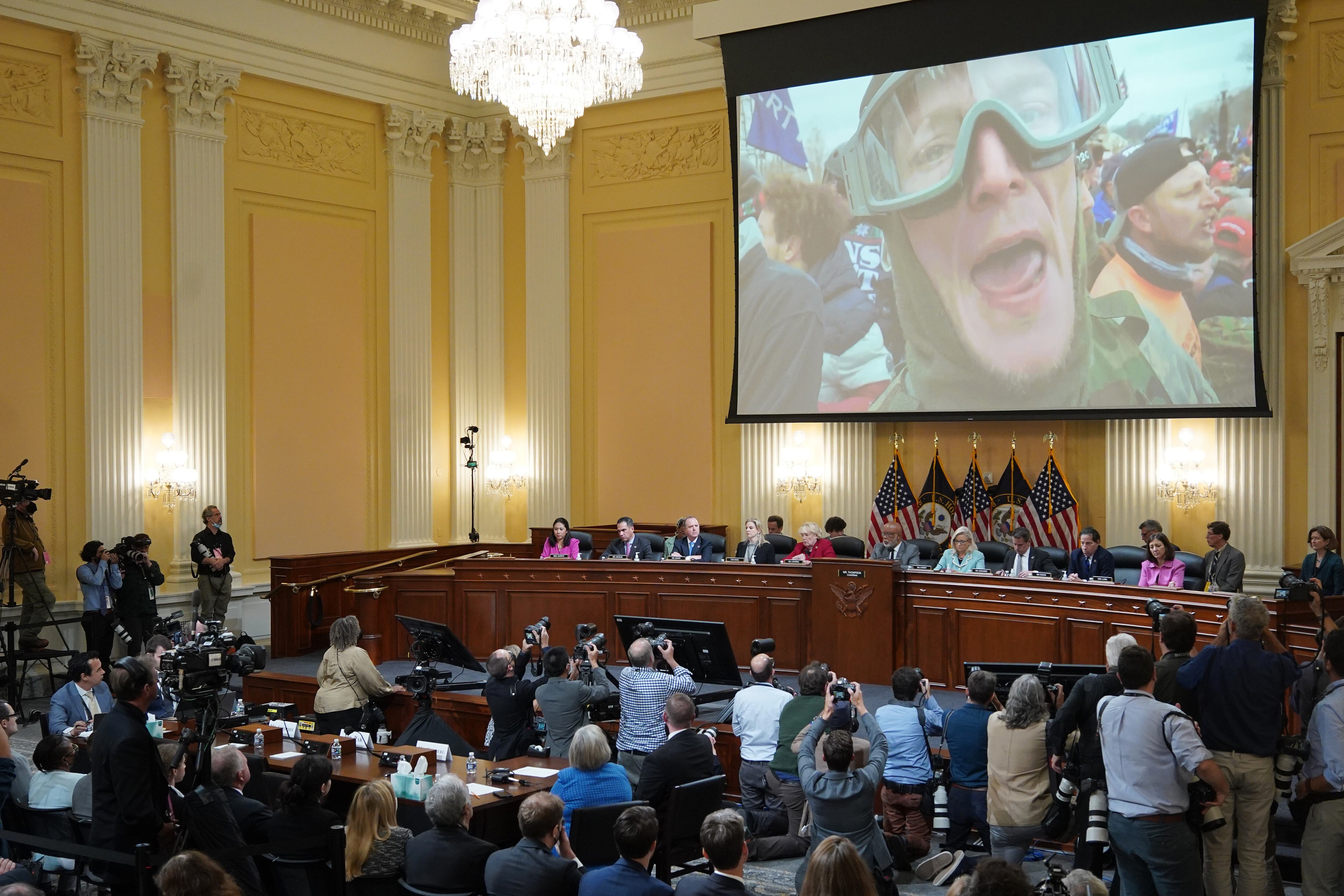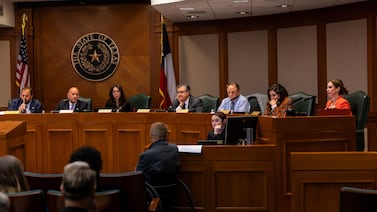A version of this post was originally distributed in Votebeat’s weekly newsletter. Sign up here.
This week’s congressional hearings were focused on the events of late 2020 and early 2021, but they are telling us a great deal about the moment we’re in now.
The congressional committee investigating the January 6 assault on the Capitol has expertly laid out the narrative showing how President Trump — ignoring repeated warnings from his innermost circle that his allegations were false — continued to insist the 2020 election was fraudulently rigged against him.
Perhaps we shouldn’t need it to be laid out in this way: We already knew his allegations weren’t true.
But — and I know I speak for more than just me — we really did need it to be laid out in this way.
A weird thing has happened even to me — a person literally paid to keep up with this stuff. The Big Lie is all so surreal, and the individuals making false assertions about 2020 seem so certain of themselves, that sometimes I fool myself into thinking there might really be a there, there. After all, isolated cases of voter fraud do happen. Is it gaslighting? The power of someone repeatedly asserting something false with total certainty? But the committee has somehow dispelled all that, laying out the timeline, the facts and the relationship between the players in such exactitude that it almost comes as a relief.
It’s not a sweeping, singular feeling of relief. I was talking to a person in the elections industry who was struck by the way the hearings proved that the people originating election lies, which so many worked so hard to debunk, knew they were false. Elections administrators, the media, and many others poured a hell of a lot of energy into mythbusting, explaining, fact-checking, and safeguarding the election and its integrity. Now we know beyond a shadow of a doubt that those who made that work so necessary and so exhausting knew the entire freaking time that they were full of it.
As validating as it is to know that former Attorney General Bill Barr was also “unimpressed” by the allegations in “2000 Mules,” even chuckling over how flawed they were, we’ve got a few far less funny things to reckon with. Such as, why didn’t the truth matter more? And how much does it matter now?
Trump, after all, somehow weaponized the lack of evidence available to support his claims, beyond shoddy and easily disproved statistics. It’s all one big conspiracy, ok? In this way, we find ourselves repeatedly having to prove a negative — rather than demanding that Trump provide fulsome evidence in support of such an earth-shattering-if-true narrative.
And somehow, even after a trillion fact checks and all this evidence, meticulously gathered and publicly shared, he isn’t the only one leaning on this playbook to rake in money and win support from the base.
A Washington Post analysis this week found Republican primary voters have nominated scores of candidates who falsely say the 2020 election was rigged. Some of them are running for positions that would give them authority over future elections.
In Pennsylvania, GOP voters chose state Sen. Doug Mastriano as their gubernatorial candidate. As a state senator, he introduced a resolution to dispute the 2020 election, and recently named Jenna Ellis, a former Trump campaign lawyer who worked to overturn the 2020 election, as a senior legal adviser to his campaign. In Nevada, Republicans threw their support behind secretary of state candidate Jim Marchant, whose campaign website proclaims that “his number one priority will be to overhaul the fraudulent election system in Nevada.” Marchant has said he believes Trump actually beat Biden in Nevada, which is (I realize I’m starting to sound like a broken record here) not true. “If rogue partisan activists who want to hijack the administration of elections in our country win positions of power, we all lose,” warned Nick Penniman, the CEO of Issue One Action, which promotes good government.
Meanwhile, in New Mexico, local Otero County officials have refused to certify the primary, forcing Secretary of State Maggie Toulouse Oliver to ask the state Supreme Court to order them to do so (the court sided with Oliver — and voters —on Wednesday). Why disenfranchise the rural county’s voters? Nothing specific, just “vague concerns” over voting machines. The commissioners declining to certify include the founder of Cowboys for Trump, who has been found guilty of a misdemeanor in connection with his presence at the U.S. Capitol Jan. 6.
In other words, there’s some evidence that disregard for the truth isn’t a dealbreaker and we can see where it leads. As Greg Jacobs, who was counsel to former Vice President Mike Pence, wrote in a statement to the Jan. 6, committee, “We are losing - I pray we have not lost - a common devotion to the first principles that have bound our people together for more than two centuries, and have made America a beacon of hope and freedom in the world.”
Trump’s doubling down, releasing a 12-page statement blasting the hearings and reiterating falsehoods about the election, complete with footnotes citing, among other things, the same “2000 Mules” film that Barr dismissed. Other politicians continue to fundraise and promote their candidacies via false allegations about elections, and the victories by Mastriano, Marchant and others show some voters are still willing to believe them.
The question leading up to November is: How many?
Back Then
In May 1973, a special U.S. Senate committee began two weeks of televised hearings into the Watergate scandal. President Nixon initially declined to allow his aides to testify, but as public pressure mounted and the committee’s investigation continued, he relented on that, though he fought the committee’s subpoena for tapes and documents in court. In 1974, with impeachment looming, Nixon resigned.
In Other Voting News
- In late 2020, a lawyer for former President Donald Trump claimed he knew of a “heated fight” taking place among Supreme Court justices over whether to hear arguments on Trump’s efforts to overturn the 2020 election results, the New York Times reported, citing emails obtained by the House select committee investigating the Jan. 6 assault on the U.S. Capitol. Separately, the Washington Post reported Eastman’s emails show he corresponded with Virginia “Ginni” Thomas, the wife of Supreme Court Justice Clarence Thomas, raising fresh questions about her role.
- A federal judge agreed to an accelerated schedule for a lawsuit seeking new Virginia House of Delegate elections. The suit alleges the 2021 elections were invalid because they were held under old legislative district boundaries because of pandemic-induced delays to the U.S. Census.
- The office of Georgia Secretary of State Brad Raffensperger has begun presenting its defense in the state’s first major voting rights trial in years.
The lawsuit was filed by Fair Fight, an organization founded by gubernatorial candidate Stacey Abrams, and alleges some of the state’s voting requirements disproportionately affect Black voters.
- A federal appeals court will hear arguments over the constitutionality of a new Florida elections law this September. Parts of the new law, which, among other things, restricts use of drop boxes, were earlier struck down by a federal judge, who said the provisions discriminated against Black voters. The appeals court put the judge’s ruling on hold, allowing the law to be used in this year’s elections, but the case is proceeding.
- Some Democrats in California, Colorado, and Pennsylvania are promoting the primary bids of GOP candidates who are prompting false claims about the 2020 election, betting those candidates will be easier to beat in a general election, but the tactic is drawing criticism for attacking Republicans who supported the results of the election.
Good News Of The Week
By Christian McCann, Votebeat intern
The governor of New Hampshire signed a bill to address “overvoting,” a rare piece of election legislation with bipartisan support. Overvoting is the term used when a voter appears to have marked too many choices in a given race. Now, ballot counting machines must divert such ballots into a side compartment when that happens so they can be properly counted.
Jessica Huseman is Votebeat’s editorial director and is based in Dallas. Contact Jessica at jhuseman@votebeat.org.






